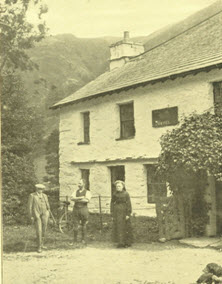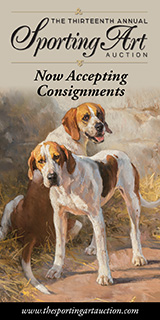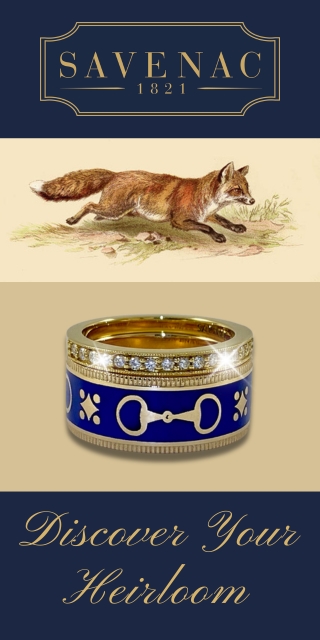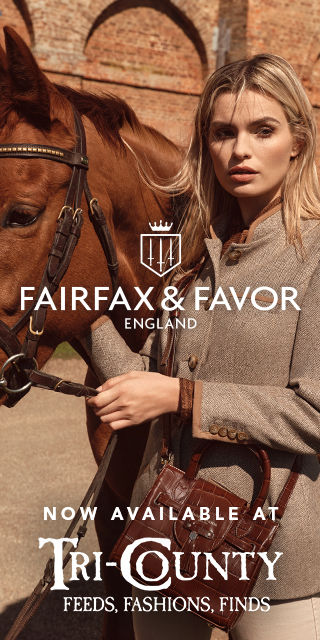lake district
John Woodcock Graves: John Peel’s Boswell
John Woodcock Graves (1795--1886)We’re all familiar with “John Peel,” surely the most well-known foxhunting song of all time. We’re perhaps less familiar with the songwriter, John Woodcock Graves, who turns out to be a most fascinating and unpredictable character—rogue some might say—in his own way. We owe this insight into Graves' life to our Cumbrian friend, Ron Black, who sent us excerpts from A Ramblers Notebook at the English Lakes (H. D Rawnsley, 1902).
In an earlier article, Foxhunting Life describes that night in 1829 when John Woodcock Graves sat in his parlor in Caldbeck, in England’s Lake District, with John Peel. Peel was a farmer, horse dealer, and foxhunter whose hounds were highly celebrated by the local sheep farmers. From the adjoining room, Graves overheard his son's granny singing an ancient Irish melody to the child. Graves took that old melody and wrote a new set of lyrics to honor his friend, John Peel.
"I sang it to poor Peel," Graves wrote, "who smiled through a stream of tears which fell down his manly cheeks, and I well remember saying to him in a joking style, ‘By Jove, Peel, you’ll be sung when we’re both run to earth!'’
Just a few years after that cozy night, however, Graves became embroiled in a violent altercation with an employee, the aftermath of which induced him to leave England forever. His adventures were just beginning.
Further Adventures of Jack and Pete
Foot hunting in the Cumbrian fells / photo courtesy of Ron Black
Further adventures of our old friends Jack and Pete in Cumbria, a majestic landscape populated by some who might see themselves as the only true purists of our sport. We hope mounted foxhunters won’t take too much offense at this story. A little will be well justified, though!
With the benefit of hindsight and a few drinks, there was a certain inevitability about the whole affair. It began innocuously enough, with Jack sitting in the pub telling us that a friend had invited him out for a day with hounds. “Wot pack?” said Pete, muscling in on the conversation.
Jack named a mounted pack some miles down the motorway. Pete took it all in and thought for a moment. “They ride,” he announced. “Not getting me on a hoss, smelly bloody things.”
Jack sighed. “We can follow in the Land Rover,” he said. “They will give us a guide.”
The Fell Foxes of Dove Crag
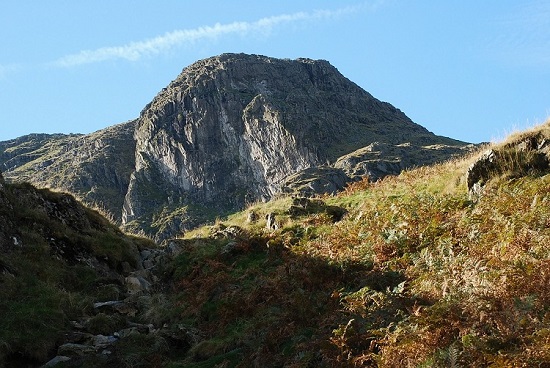 Dove Crag in the rugged Lake District of Cumbria, England
Dove Crag in the rugged Lake District of Cumbria, England
A sheep trod wove its way up the steep fell side, gaining height with an ease unmatched by any route a human could devise. Following it and climbing all the time I skirted small outcrops of rock, crossed a stream full of melt-snow water at the best point to do so, and finally arrived on the ridge. Stopping to catch my breath, for although the route to a sheep would have been easy this human was very unfit, I gazed at the view in front of me. My horizon was filled with snow covered peaks under a bright blue sky. Warm sunlight bathed the ridge and gave a small crag to my left a sharpness normally unseen.
The Coniston foxhounds had disappeared to god knows where, and had been gone for some time. I’d watched them climb the fell side I now stood on. It had been a beautiful sight as they climbed, in a line, like as someone put it “a hound trail.” Their music had carried down the valley, growing fainter as they crested the ridge and then as they dropped into the next valley it disappeared altogether, leaving an eerie silence.
Hale-Bopp and the Foxhounds
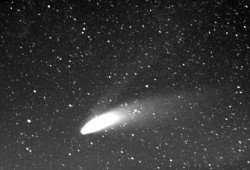 The inhabitants of the Lake District, home to the venerable foxhunting foot packs of Cumbria, have always been superstitious, their lives governed by beliefs and ritual to prevent bad luck. There were many beliefs, but the one I remember best is that in Wasdale a mother did not wash a baby’s arms until it was six months old. This, it was believed, would stop the child growing up to be a thief. As time passed, superstition of events and the cause of happenings became less, or did it?
The inhabitants of the Lake District, home to the venerable foxhunting foot packs of Cumbria, have always been superstitious, their lives governed by beliefs and ritual to prevent bad luck. There were many beliefs, but the one I remember best is that in Wasdale a mother did not wash a baby’s arms until it was six months old. This, it was believed, would stop the child growing up to be a thief. As time passed, superstition of events and the cause of happenings became less, or did it?
On July 23, 1995, Alan Hale in New Mexico and Thomas Bopp in Arizona discovered, independently, an unusually bright comet outside of Jupiter’s orbit.
Now the approach of this comet in 1997, which became easily visible to the naked eye in the night sky, did not register on the radar of Pete who only saw stars after closing time, and would never dream of looking to the heavens anyway on his way home from the pub up the streetlight-less road. As the comet neared the sun it became brighter still in the night sky, and the talk in the billiard room was of nothing else. Even hunting took second place.
Rescue on Cat Luggs
What is dog to man? What is the worth of one terrier to a band of stoical countrymen who live in a harsh place in a depressed time? How hard and how long will such men strive to save a dog from perishing, out of pure respect? Our late Cumbrian friend Ron Black gave us a story to remember.
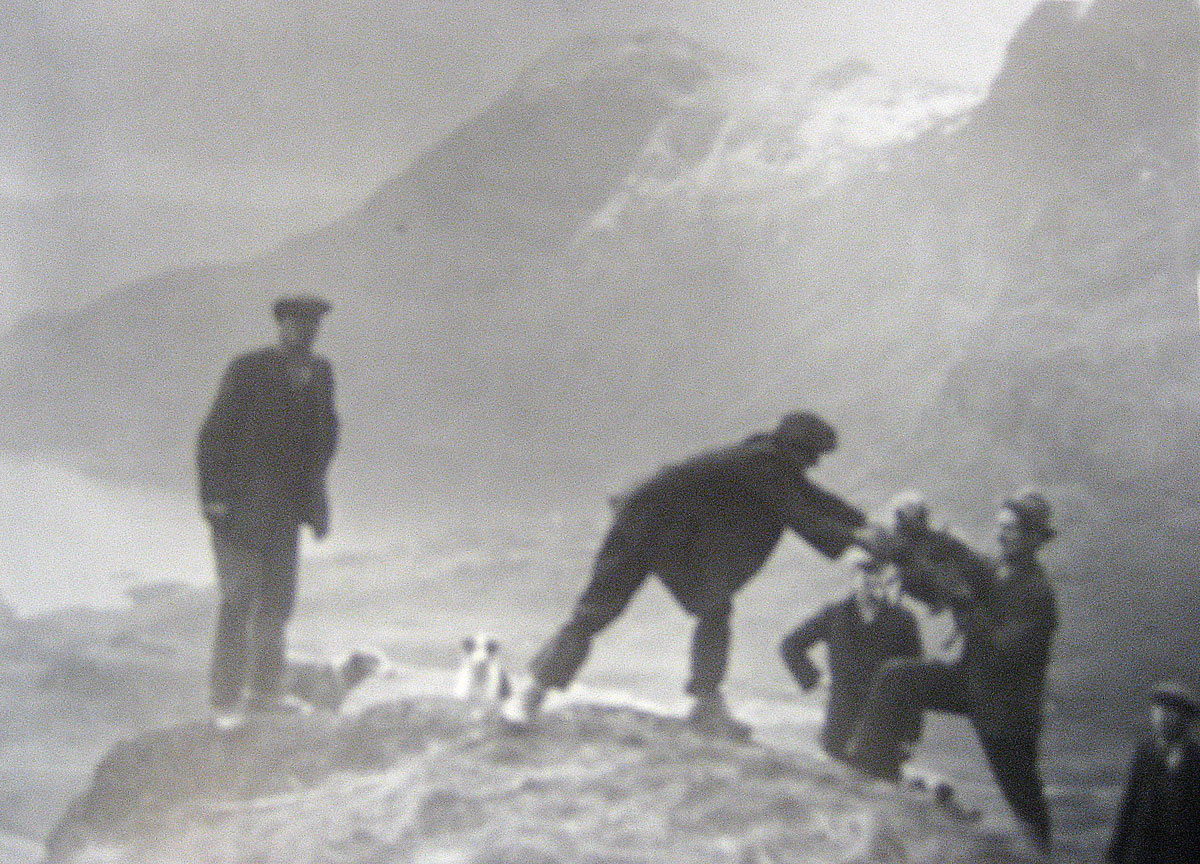 The rescue, 1934
The rescue, 1934
It’s a long pull from the New Dungeon Ghyll Hotel to the site of the borran. You first climb up Stickle Ghyll following the track as it ascends, beside the beck, at first gently, but just before Tarn Crag there is a steeper section. At Tarn Crag the track swings right-handed, and you can cross the beck and follow it up to the tarn on the left bank picking your way through the rocks.
Rescue on Cat Luggs
What is dog to man? What is the worth of one terrier to a band of stoical countrymen who live in a harsh place in a depressed time? How hard and how long will such men strive to save a dog from perishing, out of pure respect? Our late Cumbrian friend Ron Black gave us a story to remember.
 The rescue, 1934
The rescue, 1934
It’s a long pull from the New Dungeon Ghyll Hotel to the site of the borran. You first climb up Stickle Ghyll following the track as it ascends, beside the beck, at first gently, but just before Tarn Crag there is a steeper section. At Tarn Crag the track swings right-handed, and you can cross the beck and follow it up to the tarn on the left bank picking your way through the rocks.
The Mardale Hunt: Chapters 8 to 10
The Dun Bull Hotel, 1920Here are Chapters 8 to 10 of The Mardale Hunt by Ron Black. Through the courtesy of the author, Foxhunting Life is bringing you the entire book in installments every two weeks. You are free to download the book to your computer. We hope you have enjoyed the previous installments. There is one more installment to follow, which will complete the manuscript. Excerpt from Chapter 8 “A man walked over the pass from Kentmere to play the piano at each shepherds meet. He wore a fancy waistcoat with pockets. After two days of playing the piano, he ran out of money he’d earned for his efforts, so on the third morning he set off to walk home again. When he reached the top of the Nan Bield pass, he sat down to have a smoke, feeling in his waistcoat pocket for tobacco, he found half a sovereign, so he returned to the Dun Bull for another two days.” Connect with the author by clicking here. (To access downloads of previous installments, click here.) Posted February 10, 2012... This content is for subscribers only.Join NowAlready a member? Log in here
Read More
The Foxes of Cumbria
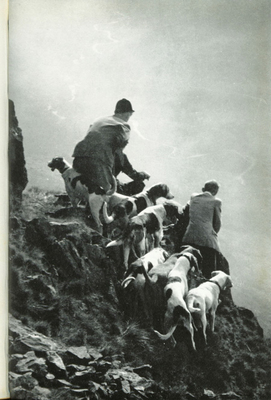 BorrowdaleIn the Lakeland District on the English/Scottish border, about four or five miles from Ambleside on the Hawkshead road is a T-junction. Turn right and the road ascends the shoulder of a small water-cut valley, finally reaching it’s destination at the Drunken Duck public house from whence a choice of routes beyond this story can be found.
BorrowdaleIn the Lakeland District on the English/Scottish border, about four or five miles from Ambleside on the Hawkshead road is a T-junction. Turn right and the road ascends the shoulder of a small water-cut valley, finally reaching it’s destination at the Drunken Duck public house from whence a choice of routes beyond this story can be found.
Hunting Songs, Volume One: The Lakeland Fell Packs
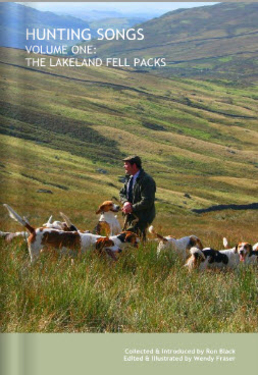 Hunting Songs, Volume One: The Lakeland Fell Packs, Ron Black and Wendy Fraser, Blurb Publishing, 2011, 75 pages, 7.50 pounds (soft cover), 15.50 pounds (hard cover), www.cumbrian-lad.comRon Black and Wendy Fraser collaborated on this collection—a folk history, really—of Lakeland hunting songs. Over the course of three-hundred years, followers of the fell packs of the English Lake District wrote these songs to memorialize historic runs, iconic huntsmen, special foxhounds, and—what pleased me especially—brave terriers! Perhaps I just never noticed, but I cannot recall any other book of hunting songs and poems that includes odes to these feisty little creatures.
Hunting Songs, Volume One: The Lakeland Fell Packs, Ron Black and Wendy Fraser, Blurb Publishing, 2011, 75 pages, 7.50 pounds (soft cover), 15.50 pounds (hard cover), www.cumbrian-lad.comRon Black and Wendy Fraser collaborated on this collection—a folk history, really—of Lakeland hunting songs. Over the course of three-hundred years, followers of the fell packs of the English Lake District wrote these songs to memorialize historic runs, iconic huntsmen, special foxhounds, and—what pleased me especially—brave terriers! Perhaps I just never noticed, but I cannot recall any other book of hunting songs and poems that includes odes to these feisty little creatures.
Or perhaps I paid special notice here because I now happen to be the smitten owner of a nine-month-old Border terrier whose ancestors scurried in their determined fashion over those same fells on the English-Scottish border. Here’s the story of Badger and Butcher by Mr. and Mrs. Curry, and it’s still sung today!
Lakeland Hunting Memories
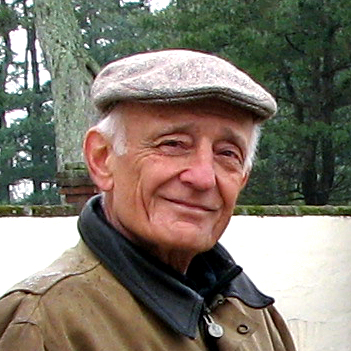 Do you know what “Forester’s Corn” is? (I’d be exceedingly impressed if you did!)
Do you know what “Forester’s Corn” is? (I’d be exceedingly impressed if you did!)
In the Lake District of northern England, during the eighteenth century, a custom by that name was practiced in which the bailiff kept dogs for the hunting and destroying of foxes and other vermin. The bailiff in the neighborhood of Patterdale received forty quarts of oats from every tenant for providing this service.
This little bit of hunting history was but one small gem gleaned from a story in a wonderful website we just discovered—Lakeland Hunting Memories—which I particularly commend to you. Whenever we find a worthy site we add it to our “Links We Like” directory (see left-hand column on the Home Page). This site, all about hunting in the Lake District of northern England, is beautifully written and sensitively presented by Ron Black in Cumbria, UK.


